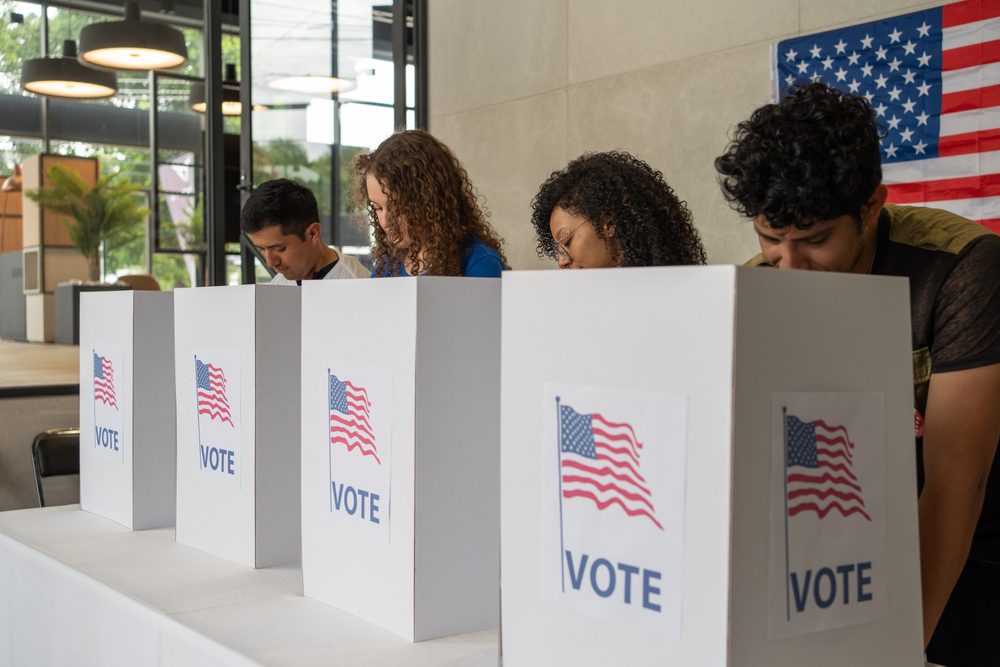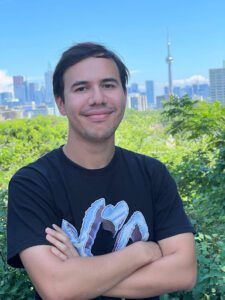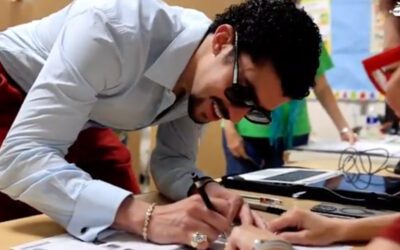
FAU’s Latino student population discusses immigration, the economy and identity, as historic Hispanic voter turnout is expected in 2024.
Florida’s growing Latino population is taking center stage in the 2024 presidential race as analysts are projecting a historic Hispanic voter turnout. Approximately 28% of the student body at Florida Atlantic University (FAU) is Hispanic, giving the Boca Raton-based institution a front row seat to the political pulse of some young Latino voters who will play a key role in the election.
Floricua conducted five interviews with FAU Latino students and heard their concerns about issues including immigration, economic hardship, and cultural identity.
Complex feelings on immigration
For freshman Sheyli Tomas Sales, whose parents immigrated from Guatemala, the upcoming election is an opportunity for her generation to push for change. “This will be my first time voting,” she shared, “and it’s important because we’re the ones constantly talking about how we need change.”
Sheyli Tomas Sales. Photo courtesy of Sales.
Yet, Sheyli, like many other young Latino voters, is concerned about finding a candidate who genuinely represents her views. She mentioned Kamala Harris as someone she identifies with because of her focus on women’s rights and immigration, issues that are personal to her as a Latina. “Kamala Harris has immigrant parents and because of that, she has a point of view that we have as well, as most of our parents are immigrants,” she said.
For her family, immigration is the most important reason why they are voting for Harris. Sales expressed that her parents and her five siblings had multiple moments of fear of a potential deportation of her mom when Trump was president.
“We had a few scares while he was in the chair as a president, and it was just like a really hard time for her just because she was really overthinking it, and we did have a scare where she potentially could have been deported,” she said.
Both of her parents came from Guatemala. Her mother was 21, her father was 14, and they met in the United States.
“My dad came alone, and so he had to find his own way. He found a job, and he’s built himself, I would say from the ground up. I really see him as a role model just because he’s such a hard worker as well as my mom. My mom came when she was around 21. She already did have kids but she wanted something new and wanted something better for her, my three older brothers. She came from Guatemala, and now she has her own business, her own cleaning business. My parents are my role models,” she said.

Sheyli Tomas Sales with her family. Photo courtesy of Sales.
Immigration stands as a key issue among Latino students at FAU, many of whom have personal connections to the topic. For Alexander Granados, a student with family roots in El Salvador, the issue of immigration isn’t just political, it’s personal, and it’s the most important issue for him and his family.
His father, who came to the U.S. at 14, instilled in him an understanding of the hardships faced by immigrants. “I feel like immigration affects us more as Latinos because I know a lot of people going through this. My dad came to this land illegally so I understand where people are coming from and like why they do it,” he said.
Granados expressed that he hopes the new president works on the immigration issue with a perspective of sympathy for what immigrants might be escaping in their home countries.
“It’s important to acknowledge the reasons why people are coming over here and understand like they’re not, they paint them as criminals, but like it’s not always the case most of the time because they’re coming to live for a better life. It’s their last resort, I guess, so you shouldn’t judge them so harshly,” he said.
David Linares, a political science major and a vocal member of Students for Life and Turning Point USA, holds a more conservative stance on immigration, noting, “My father came here from Cuba, and while I respect our heritage, I believe we need a more sustainable approach to immigration.” He also emphasized the importance of understanding the reasons behind immigration, adding, “We shouldn’t judge people so harshly when they’re coming for a better life. But we also need to have a process that doesn’t overlook our own needs.”
Latino heritage and American identity
Many Latino students are navigating the intersection of cultural heritage and American identity. Linares, who identifies strongly with his Latino roots, expressed that for him and his family as Hispanics, one of the biggest issues that bothers them is the lack of assimilation into American culture.
“I have no problem embracing both my Hispanic background from both countries and also my identity as an American, but it seems to me more and more a lot of Hispanics seem more proud of the legacy of the countries that they left instead of the legacy and the heritage of the country that they made their home,” he said. He noted that while he respects the legacy of his heritage, he believes Latinos in the U.S. should also adapt to the American identity.
Linares thinks the identity problem he refers to is the reason why a lot of Hispanics don’t feel included and oftentimes might feel targeted.
“I think it is unfortunate that a lot of Hispanics, I think it’s about 60 percent, especially among young people like 18- to 25-year-olds, choose the Democrat Party and think that they support them only because, they are definitely put off by a lot of the anti-immigration rhetoric that the Republican Party has. They think that they are being targeted just because they’re of Hispanic origin,” he said.
Despite Linares’ concerns about Hispanic voters aligning with the Democratic Party because of anti-immigration rhetoric, he emphasized a deeper connection to shared American values, regardless of ethnic background.
“I believe that I and my family, and we believe this too, that we have more in common with our neighbors, whether they’re of African American origin or European origin or Hispanic origin, but we have more in common with them, our fellow Americans, than we do with a Cuban or Uruguayan who we’ve never met back in our countries of origin,” he said.
Lukah Meirelles, a theater major, expressed that his Latino identity has been a source of pride, though he has concerns about certain cultural shifts. “I see terms like ‘Latinx’ and feel they’re just not respectful to our language or culture. We have bigger issues to worry about, like affordable housing and safety,” he said.

Lukah Meirelles. Photo courtesy of Meirelles.
A growing voting block divided
According to the NALEO Educational Fund, 2.5 million Latinos are registered to vote in Florida, comprising 18% of all registered voters, and voter turnout among Hispanics is expected to rise by nearly 14% compared to the last election cycle. One in five eligible voters in Florida is Hispanic. Latino students at FAU recognized the importance of their vote and they seemed divided.
With just over a month to go before the November general election, a new poll by immMason-Dixon Polling & Strategy from Sept. 23 to Sept. 25 shows that Florida’s Hispanic voters back Donald Trump over Kamala Harris by a 7-point lead. With the biggest difference seen between Cuban voters who favor (61%) Trump over Harris, and Puerto Rican voters who support Harris over Trump by 58% to 33%.
Prices, inflation, and the general feeling that the economy was not going in the right direction were a common feeling the interviewees shared.
Meirelles expressed the economy is something he and his family consider very important as they have been financially struggling.
“It has been extremely tough for me lately when it comes to shopping for groceries or trying to buy a house because my mother and I were trying to buy property here in the state and it’s been a challenge for us, you know, and as of lately, you know, because it’s just gone up and in the past 10 years and it’s just gotten to a point where it’s just not realistic for us. And I have two jobs, sometimes the third one for freelancing and editing, which is what I do, and I’m barely getting by and that’s just not a way of living,” he said.

Yisset Hardy. Photo courtesy of Hardy.
For Yisset Hardy, an FAU student born in the Dominican Republic, the background and heritage she comes from shapes the way she views America’s political landscape.
“My background allows me to see how the political issues in developing countries often reflect a lack of attention to the needs of the people, particularly in terms of economic development, security, and governance,” Hardy expressed. “These issues mirror the political struggles I’ve witnessed in my native country, which has made me more conscious of the need for strong, effective policies, and leadership.”
Despite varying levels of enthusiasm, the young Latino voters at FAU reflect a key demographic that political campaigns cannot afford to ignore. As November approaches, these students’ voices highlight the diversity of thought within the Latino community, as well as the complex blend of identity, heritage, and policy concerns that shape their views on voting.
For many young Latinos, the 2024 election represents both a responsibility and an opportunity to make their voices heard on a national stage.
RELATED: This group helped more than 700 college students register to vote ahead of fall semester start
Editors note: a version of this article was published first at Upressonline.com

Harris says nation must accept election results while urging supporters to keep fighting
Harris delivered her remarks at Howard University, her alma mater and one of the country's most prominent historically Black schools, in the same...

What happens next? A timeline of the process between voting and inauguration
Here's what happens next, from the moment the last vote was cast to Inauguration Day on Jan. 20, 2025—no conspiracy theories, no unfounded claims,...

5 places in Florida to donate clothes, shoes, and more
Decluttering your home can provide such a satisfying feeling of accomplishment. After sorting through all of your belongings and determining what...

8 Orlando hotels that pack as much fun as the theme parks
With waterslides, family arcades, playgrounds for the kids, and spas for mom and dad, these Orlando hotels will make your vacation unforgettable!...




